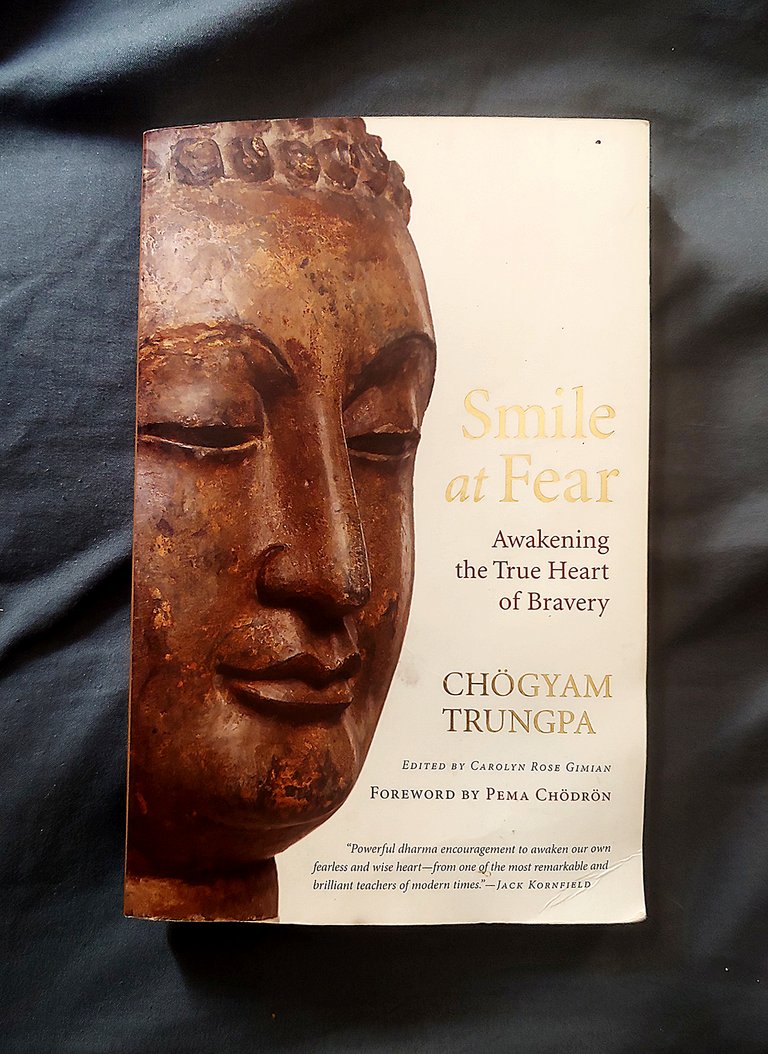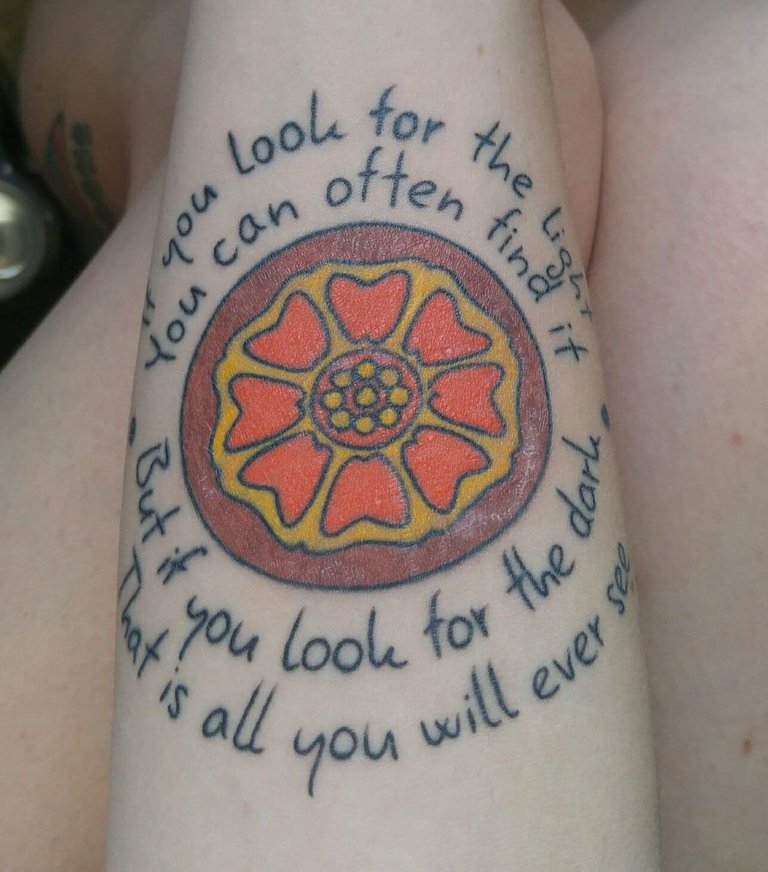The Buddhist Approach to Conquering Fear

Today I finished the book Smile At Fear by teacher Chögyam Trungpa. It is a work of literature that focuses on conquering fear through the means of Buddhism.
A quick sidenote might say, Buddhism has not been one of my "go-to" religions. Meditation can be appreciated, because it is a skill that has been practiced since the dawn of time and has actually been proven to have scientific validity to it. As for the other "main pillars": reincarnation, enlightenment, "the moon in my heart"... It hasn't been an easy religion for me to identify with! Regardless, I gave this book a chance, and it was alright! 👍
"Where does fear come from? ... Being unable to synchoronize your mind and body."
Chögyam notes that the reason we experience fear is because we have not bothered to sit down with ourselves and find out what kind of people we truly are. This is the very first step to conquering fear, yet it is a step that not many people will take, due to the fact that too many people are ashamed of themselves, for one reason or another. Many of us believe we are not "worthy" of being human beings.
"One of the main obstacles to fearlessness is the habitual patterns that allow us to deceive ourselves. ... Experiencing the innermost core of their existence is embarrassing to a lot of people."
The reason for this inadequecy, again, is due to the fact that we believe we have a reason to be ashamed of ourselves. Chögyam tries to explain that every human is born with inherent goodness within them. If you viewed your lifestory from the moment of conception up to the present day, you would find that there is nothing embarrassing about who you are, or what you've done. (Of course, this advice applies to the average person. If you, for example, killed someone, you may have to do some more repentance to make up for that error!)
"You have something in yourself that is fundamentally, basically good. ... The buddhas who have already gone beyond, exists in you."
So, what do we do with ourselves as opposed to reflecting on our lives? We use distractions! Endless distractions -- TV, music, video games, drugs, clubbing, sex, driving -- take our minds away from where they truly need to be. And we live in a world that has never been short of distractions -- I remember hearing a quote that the world has been specifically designed to drive you insane! Even something as simple as reading a book shows that we constantly need to be doing something in order to avoid confronting our habits and ourselves.
"We always try to do something with ourselves, rather than simply be with ourselves. ... In that case, the essence of what you are is impossible to find."
Chögyam also explains the reason why it is so important that we take this journey on ourselves, is because no one else can do it for us. Of course we can have mentors and literature to guide us in the right direction, but only we can truly help ourselves. It is a bittersweet lesson, and perhaps it is one that you have experienced for yourself. It is a scary journey to take alone, and it is painful once we realize that we cannot help others help themselves...
"We also have to give up on the notion of a divine savior ... the idea of someone or something who will save us without our having to go through pain. ... Nobody can save you from yourself."
Once we have confronted ourselves, we must begin to put this sense of fearlessness into practice. Chögyam advises us on the next necessary step to take: we must learn to have a gentle approach to life. We must learn to be gentle with ourselves, so that in turn, we can learn to be gentle to the world.
"The ground of fearlessness is the development of renunciation. ... overcoming that tough, aggressive mentality which wards off any gentleness that might come into our hearts. Fear does not allow tenderness to enter us."
Every action has a reaction, and when we greet our fears and problems with opposing force, it can only cause things to intensify. Instead, act calmly and rationally. Chögyam also warns to never perceive an enemy when there isn't one -- to avoid getting defensive before you have even heard what someone has to say. The only time when force is permitted, is when the enemy absolutely refuses to listen to reason, or if they physically try to attack you.
"That is the whole point: when you do not produce another force of hatred, the opposing force collapses. ... You have to see that your problems are not really trying to destroy you. ... Learn to be friendly towards your problems."
Chögyam teaches us that our personal experiences are gifts to share with the world. To think, the only reason we are blessed with such infinite knowledge is because our ancestors were kind enough to pass on their experiences to us. Imagine if our ancestors had never passed down their knowledge of which plants are edible and which are poisonous. Imagine if all the great artists before us never bothered to teach us their techniques. Imagine if Edison had kept the secret of electricity to himself!
Hence why everything begins with us, looking within ourselves. When we have no reason to be ashamed of our experiences, then nobody can hold them against us; we have nothing to fear. So long as we have learned from our mistakes, we can acknowledge and appreciate them.
"There's only one way a true warrior can project to others: through personal understanding. Then you can demonstrate to people that their poor logic about their lives does not hold truth."
For example, becoming an addict has been one of my greatest accomplishments. I experienced something that not many people get to come back from, and I did it entirely on my own. I experienced something that not many people get to firsthand. Rather than everyone else becoming an addict to experience it for themselves as well, I have been using the knowledge that I gained from it to help people. Similar to Chögyam's message, you cannot "save" others, and people can only help themselves if they so choose to do.
After reading this book from start to finish, there were two quotes that really stood out to me:
"Success being failure, and failure being success. Success sows the seeds for future failures, and failure may bring a latter success."
Again, going back to my addiction experience, I think that being an addict can typically be perceived as a failure! But because I chose to evolve from it and use the experience to my advantage, it has now become one of my greatest successes! Similarly, aiming for success opens the door for possible failures -- not that failure will happen, but it automatically becomes a possibility. This is why it is so important to be gentle with ourselves and our "problems." After all, the only time when we truly fail is when we quit and decide never to try again.
"When you acknowledge that you feel so wretched, you can be fully cheerful. ... If you see the actual darkness, that will inspire light or sunrise."
Believe it or not, this is actually a quote that I had done as a tattoo several years ago. In fact, the inspiration came from the show Avatar: The Last Airbender, which if you know anything about that series, you know that it is heavily influenced by Asian culture and Buddhism:
 ("If you look for the light, you can often find it / But if you look for the dark, that is all you will ever see)
("If you look for the light, you can often find it / But if you look for the dark, that is all you will ever see)
If what the Buddhists believe is true, that there is inherent goodness within all of us, then there has to be more light than darkness; similar to the steps of this book, we just need to open our minds to it first. Once again! going back to my experience as an addict -- that was, without a doubt, the darkest period of my life. Yet when I look back at it now, I am filled with so much joy and comfort because of the fact that I made it out and am no longer there! Whatta beautiful experience it is!
🎉 Upvoted 🎉
👏 Keep Up the good work on Hive ♦️ 👏
❤️ @palomap3 suggested sagarkothari88 to upvote your post ❤️